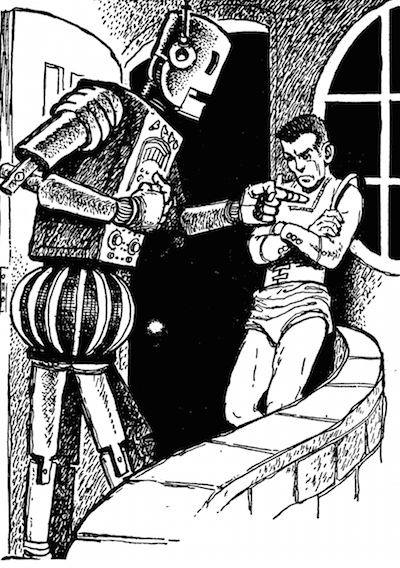Science Fiction
Dictionary
A B C D E F G H I J K L M N O P Q R S T U V W X Y Z
Sprint Wants Sales Robots

Telecom giant Sprint is thinking about trying to improve your customer experience by using robot sales clerks in their stores.
(Sprint sales robot talk TC3 summit Wayne Ward video)
Wayne Ward, Sprint VP of business and product development said during the recent TC3 conference in Mountain View, Calif., that Sprint is considering ways to use parent company SoftBank’s consumer humanoid robot “Pepper,” which the company describes as “able to converse with you, recognize and react to your emotions, move and live autonomously.”“The concepts that we’re looking at in terms of how [Pepper] would help us would be, No. 1, can we use Pepper in our own retail stores to help with hosting and greeting customers? Can we utilize Pepper as a way to demonstrate products? And also to drive traffic into stores. To some degree, Pepper can emote and has human-like qualities. We feel that’s something people are interested in.”
“Then, more specifically, what we’re looking at is how we can introduce the concept of Pepper to our enterprise customers and help some large enterprise customers in the area of manufacturing and robotics … in the same manner we would be using Pepper as greeter staff, as shopper concierge. Those are two of the general areas we’re looking at.”
Loyal Technovelgy readers have encountered Pepper before; see Pepper, Your Roboti Companion to refresh your memory (or catch up!).
Philip K. Dick was a bit less enthusiastic about sales robots in his possibly prophetic 1954 short story Sales Pitch:
Robot-salesmen were everywhere, gesturing, pleading, shrilling. One started after him and he quickened his pace. It scurried along, chanting its pitch and trying to attract his attention, all the way up the hill to his living-unit. It didn't give up until he stooped over, snatched up a rock, and hurled it futilely.

Via RC Wireless.
Scroll down for more stories in the same category. (Story submitted 10/14/2015)
Follow this kind of news @Technovelgy.| Email | RSS | Blog It | Stumble | del.icio.us | Digg | Reddit |
Would
you like to contribute a story tip?
It's easy:
Get the URL of the story, and the related sf author, and add
it here.
Comment/Join discussion ( 0 )
Related News Stories - (" Robotics ")
Atlas Robot Makes Uncomfortable Movements
'Not like me. A T-1000, advanced prototype. A mimetic poly-alloy. Liquid metal.' - James Cameron, 1991.
Humanoid Robots Tickle The Ivories
'The massive feet working the pedals, arms and hands flashing and glinting...' - Herbert Goldstone, 1953.
Golf Ball Test Robot Wears Them Out
"The robot solemnly hit a ball against the wall, picked it up and teed it, hit it again, over and again...' - Frederik Poh, 1954.
PaXini Supersensitive Robot Fingers
'My fingers are not that sensitive...' - Ray Cummings, 1931.
Technovelgy (that's tech-novel-gee!) is devoted to the creative science inventions and ideas of sf authors. Look for the Invention Category that interests you, the Glossary, the Invention Timeline, or see what's New.
Science Fiction
Timeline
1600-1899
1900-1939
1940's 1950's
1960's 1970's
1980's 1990's
2000's 2010's
Current News
The New Habitable Zones Include Asimov's Ribbon Worlds
'...there's a narrow belt where the climate is moderate.'
Can One Robot Do Many Tasks?
'... with the Master-operator all you have to do is push one! A remarkable achievement!'
Atlas Robot Makes Uncomfortable Movements
'Not like me. A T-1000, advanced prototype. A mimetic poly-alloy. Liquid metal.'
Boring Company Drills Asimov's Single Vehicle Tunnels
'It was riddled with holes that were the mouths of tunnels.'
Humanoid Robots Tickle The Ivories
'The massive feet working the pedals, arms and hands flashing and glinting...'
A Remarkable Coincidence
'There is a philosophical problem of some difficulty here...'
Cortex 1 - Today A Warehouse, Tomorrow A Calculator Planet
'There were cubic miles of it, and it glistened like a silvery Christmas tree...'
Perching Ambush Drones
'On the chest of drawers something was perched.'
Leader-Follower Autonomous Vehicle Technology
'Jason had been guiding the caravan of cars as usual...'
Golf Ball Test Robot Wears Them Out
"The robot solemnly hit a ball against the wall, picked it up and teed it, hit it again, over and again...'
Boring Company Vegas Loop Like Asimov Said
'There was a wall ahead... It was riddled with holes that were the mouths of tunnels.'
Rigid Metallic Clothing From Science Fiction To You
'...support the interior human structure against Jupiter’s pull.'
Is The Seattle Ultrasonics C-200 A Heinlein Vibroblade?
'It ain't a vibroblade. It's steel. Messy.'
Roborock Saros Z70 Is A Robot Vacuum With An Arm
'Anything larger than a BB shot it picked up and placed in a tray...'
A Beautiful Visualization Of Compact Food
'The German chemists have discovered how to supply the needed elements in compact, undiluted form...'
Bone-Building Drug Evenity Approved
'Compounds devised by the biochemists for the rapid building of bone...'
